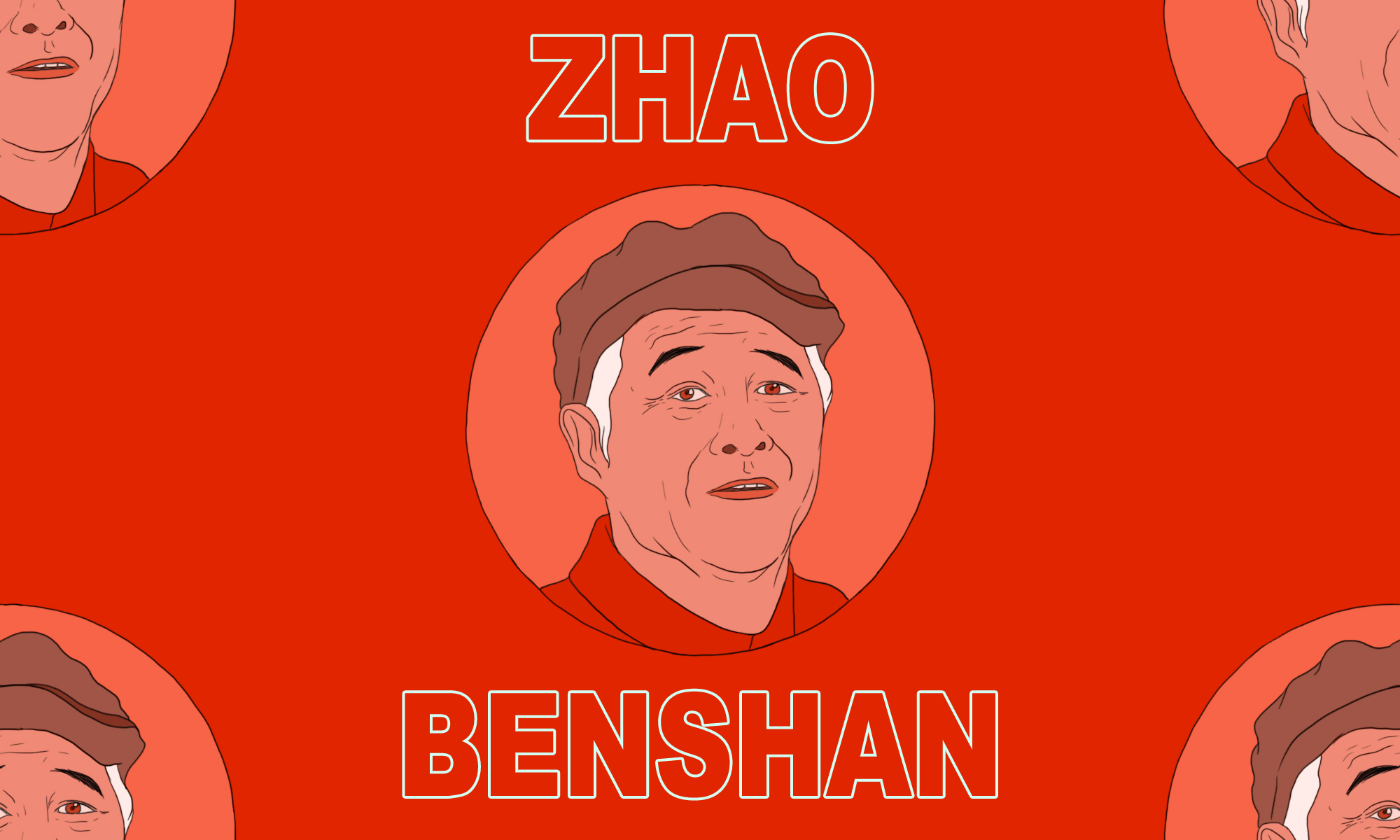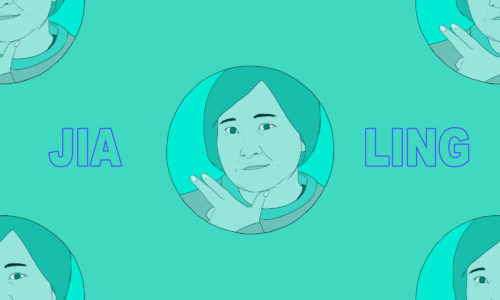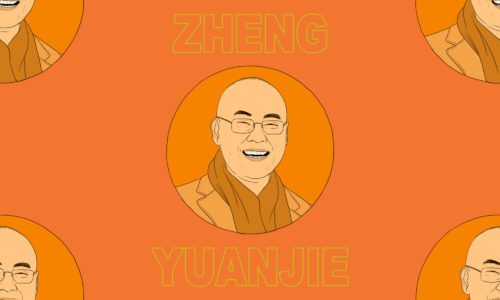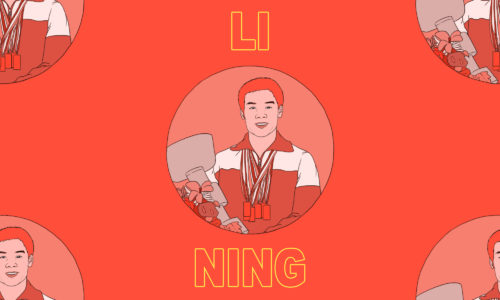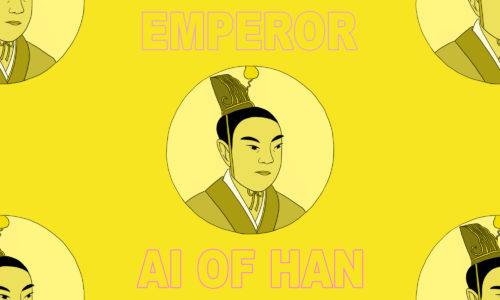In 2015, the Spring Festival Gala sprang a surprise on its audience — by who wasn’t there. For 21 years, Zhào Běnshān 赵本山 had been the toast of the gala, audiences eagerly waiting for him to appear, sometimes partnered with Sòng Dāndān 宋丹丹, often dressed in his trademark blue Mao suit and cadet hat. He often played a simple, earthy character with a voice rich in Dōngběi huà 东北话, a dialect from the rust belt of northeastern China.
In 2003 Zhao had been elected to the National People’s Congress, the highest honor the Party can bestow to an ordinary citizen. He was the chairman of Benshan Media (currently worth 125 million RMB, or $19 million), amassing a fortune big enough to make him the first Chinese celebrity to buy a private jet in 2009. But 2014 saw him — and the traditional Dongbei “èrrénzhuàn 二人转” (literally, “two-person rotation”) style that he had made his own brand — disappear from the nation’s airwaves, apparently at the behest of Xí Jìnpíng 习近平 himself.
When Zhao had first appeared, commentators labeled him a “Chinese Charlie Chaplin.” He was an immediate superstar with the comic persona of the everyman, a lens through which to see the ridiculousness of modern life. By the end, he was being compared to a Chinese “Frank Sinatra,” a kingpin who’d used his fame and contacts to dubious political and financial ends.
Who is Zhao Benshan?
Depending on who you ask, he’s a much-missed lovable rogue, or a money-grubbing fixer — little better than his most iconic character, Dà Hūyou 大忽悠.
This questionable figure first appeared in the 2001 Spring Festival sketch “Selling Crutches.” Zhao ambles onto stage as Huyou (whose personality will be familiar to anyone who’s watched the antics of wheeler-dealer Del Boy from the UK sitcom Only Fools and Horses), grumbling about the time wasted over creating a pair of crutches to sell a hospitalized neighbor, only for them to be given a wheelchair by the hospital. He bets his wife he can sell them to someone “with a pair of good legs.” Over the course of the sketch, Zhao manages to make the gullible Chef Fan effectively cripple himself enough to need his crutches, in return for his bicycle and all the money he has on him. Viewers loved it. From then on, “huyou” — an obscure term from northeastern dialect — came into the Mandarin vernacular to mean swindling or fooling someone.
Huyou served Zhao well in numerous Spring Festival galas, the stings on Chef Fan becoming more elaborate each year: convincing Fan he had a mental illness which required a wheelchair, in 2002…
…and a stretcher in 2005:
Intellectuals denounced the vulgarity and bad influence of these get-rich quick sketches. “They either treat cheating or being cheated as ridiculous…so much so that people have lost the direction of moral judgement in the satisfaction of stimulating their senses,” sniffed cultural scholar and Tsinghua professor Xiao Ying. But to others it was the kind of “hēitǔ wénhuà 黑土文化” (“black earth culture”) the masses could relate to — the Da Huyou sketches were often voted the best of the gala. Academics saw them as on-the-nose satire of phenomena from the early years of reform and opening, like the gullibility of Falun Gong followers or society’s sacrifice of morality for profit. Huyou would have represented “an overkill of the market mentality” for Chinese audiences, according to Aili Mu of Iowa State University.
It was a more open time, one where cadre corruption could be called out. Here’s Zhao as “Uncle Niu” in 1995, a humble teacher compelled by Party cadres to stand in for their boss, hospitalized after eating too much at a state-funded banquet (the sort often used to grease wheels and promote business). For Professor Wenwei Du of Vassar College, such sketches reinforced for audiences how marketization was leading to “tainted moral principles in the state sector.”
Such humor would have come from Zhao’s own experience of poverty in Liaoning. Born just as the Great Leap Forward began in 1958 to a poor farming family, we can assume Zhao’s first years weren’t ones of abundance. His mother died when he was five, his father then banished to the northeastern frontier to work land that needed to be cultivated. Zhao was raised by relatives and neighbors, apprenticed to his blind uncle, where he learned how to play traditional Chinese instruments and the grassroots art of errenzhuan.
Errenzhuan is a traditional form of opera unique to the northeast, initially started by farmers as a way to make money while they waited for the harvest. At its most quintessential, it consists of a male and female performer dancing with red handkerchiefs, multi-roling an opera performance or engaging in a comedic double act.
But by the 1980s and ’90s, when the industry had become overcrowded and came under siege by other consumer distractions like TV, the art form became increasingly bawdy to lure crowds. So many performers (almost all untrained peasants “gloriously laid-off”) needed work that managers could assign an acting pair a half-hour slot and, according to Zhao in an article in 2006, “If you could not make the audience laugh, you would be kicked out of the theater by the manager, and there was no coming back.” As a teenager he joined a local performing theatrical troupe, later moving to Tieling.
His first break came in 1980 when he won first prize in a rural opera performance in Liaoning, playing the blind character Zhang Zhi in Shuāi Sānxián 摔三弦. He began being a staple and familiar acting talent for local Spring Festival galas in the northeast. His comic talents were noticed by the cross-talk (or “xiangsheng”) artist Jiāng Kūn 姜昆, who recommended Zhao to be included on CCTV. He first appeared in the national Spring Festival Gala in 1990 — his style proved so popular (and what was more, part of an indigenous culture worthy of nurturing) that CCTV began asking more and more errenzhuan performers to create shows for them, albeit stripped down to just the comic sketches.
A film career beckoned for Zhao, riding on his newfound popular appeal to appear in minor roles in the work of big-name directors like Zhāng Yìmóu 张艺谋 (Keep Cool) in 1997 and Chén Kǎigē 陈凯歌 (The Assassin) in 1998.
But he was best-loved for his portrayal of simple rural life. He was nominated for Best Actor at the Golden Horse Awards for his starring role in 2007’s Getting Home, portraying a migrant worker dragging the dead body of his friend back to his hometown:
At the same time, he was churning out episodes for three separate TV series based on rural life around Liaoning — playing on the problems of the urban and rural divide, or the contradictions between young people seeking to move to the cities and the older generation wanting them to stay. They proved immensely popular, and by the 2009 Spring Festival he was participating in the galas of five different TV stations. It was reported that his appearance fee increased in just six months from 20,000 RMB ($3,000) to 300,000 RMB ($46,400). Stories of his extravagant wealth — for example, buying a jeep with a personalized number plate — circulated online. There was something jarring in a man who had risen to fame based on the image of a rustic Dongbei farmer now being so horrifically rich.
Chinese Del Boy
Zhao’s huge wealth (ranked sixth on Forbes’s celebrity rich list in 2012) came from his second life as a savvy, but problematic, businessman.
He proved to be a flexible opportunist: In 1993, he established Shenyang Benshan Art Development Co. The business was initially in culture, TV, and film, but when Zhao saw how hard it was to muscle in on the TV market, he changed tack. A change in government energy policies in the northeast led to his “art” company transporting coal and oil instead. He happily capitalized on his own fame to build a market brand: In 2002, following the huge rating success of his TV series Liu Laogen, he set up the “Liu Laogen Stage” on Shenyang’s main street, performing mainly comic errenzhuan sketches interspersed with snippets of traditional song and dance numbers. The theater franchised across the country — his face was the brand, the product a monotonous stream of rural underdog characters.
Through his Benshan Media Group (also called the “Liaoning Folk Art Troupe”), Zhao was claiming ownership of all stages of the errenzhuan industry, from production of talent (partnering with the performance art college at Liaoning University) right through to performance and public exposure. A scriptwriter who used to work for Zhao told The Paper in 2014 that Zhao “pushed the errenzhuan actors into the Spring Festival Gala and his TV series so that audiences would become familiar with them, and then used the popularity of these actors to in turn boost Liu Laogan’s box office.”
He also enjoyed state backing. In 2004 the Ministry of Culture named the Liaoning Folk Art Troupe in its first list of “Cultural Industry Demonstration Bases,” and in 2010 picked them for “National Cultural Tourism Key Projects.” Local state channel Liaoning TV (sometimes known as the “Benshan channel”) hosted TV shows like Who’s Benshan Taking to the Spring Festival Gala, where Zhao chose new apprentices in an America’s Got Talent format.
It was a shrewd move. Zhao was protecting an intangible cultural heritage, providing jobs for Dongbei’s waning economy, developing a posse of famous actors all loyal to him, fixing his face to errenzhuan across the country, and making a mint, all in one fell swoop. The Liu Laogen Theaters pulled in annual revenues of 148 million RMB ($23 million) by 2014, mostly from tourists.
That Zhao had high-profile political connections, and put them to good use, is obvious: In 2009, he spent 1.3 billion RMB ($201 million) on land rights for 800 mu (132 acres) in Boao, Hainan province (where the annual Boao Forum, the “Asian Davos,” is held each year). This made no sense, given how Hainan was a backwater. But only a few days later the State Council issued a document “promoting the construction and development of a Hainan International Tourism Island.” Real estate prices immediately began booming as investors started tapping into this market.
By this point, the bawdy humor of errenzhuan (where masturbation jokes could be slid between classic lines of poetry) was becoming notorious. By 2010, Hán Zàifēn 韩再芬, vice chairman of the Chinese Theater Association, was condemning errenzhuan as “grotesque, with not a trace of cultural value or depth.” Zhao’s own theaters practiced “green errenzhuan,” gags devoid of innuendo, allegedly fining any performers who cracked a dirty joke in his venues. But he appeared unfazed as to the rest of the genre. “Errenzhuan is like pig’s tripe,” Xinhua reported him as saying in 2014. “Once it is thoroughly cleansed, it is no longer errenzhuan.”
The Party intervenes
2014 was the year the tripe ended, with Xi’s anti-corruption drive. Perhaps the leadership wanted to cut down on a vulgar genre that Zhao happened to be popularly associated with. Or maybe Zhao had become a bit too close to Bó Xīlái 薄熙来 during Bo’s time as governor of Liaoning. “What everybody forgets in hindsight is just how difficult it would have been for someone like Zhao to maintain distance from Bo,” Mark Rowswell, a.k.a., Dashan, a Canadian comic famed in China, told GlobalPost. “The former is by far the most famous cultural figure to come out of Liaoning Province in the past 20 years, while the latter was a very dynamic Party Secretary.”
At the Beijing Forum on Literature and Art (which Zhao had been notably omitted from) in October 2014, Xi stated that some art forms tore down what was good in art, that “blindly chase and cater to public tastes and vulgar interests,” but that such art forms should remember their primary purpose was to “serve the mass and the Party” and “not lose direction in the wave of market economy and be the slave of capital.” “There has since been very little media exposure of errenzhuan,” Dr. Haili Ma, an expert in Chinese opera and politics, wrote in a paper in 2019.
Zhao fawned desperately, saying he’d read Xi’s speech “repeatedly and carefully,” and was so excited by it he was “unable to sleep at night” during a special study session at Benshan Media, of the Forum he’d been excluded from. But the situation was hopeless. He was bumped off the list of NPC delegates, with Liaoning TV and his feeder institutions at Liaoning University severing all projects. Rumors started to circulate he had been arrested for mafia involvement and hoarding pornography, 20 tons of gold bars found in his home. He refuted them, in a rare appearance at the Liu theater. “Did you think you’d never see me again because they say I have 20 tons of gold in my home? I even believed it myself!”
He certainly had fewer tons to spare: Forbes noted his profits dropped from 115 million RMB ($18 million) in 2012 to 32 million RMB ($5 million) in 2014.
Zhao’s empire goes on, ostracized and downsized: Liu Laogen Theaters still peddle performances at high prices across the country; Benshan Media still plods out rural comedies; Zhao directed and starred in Liu Laogen 4, released in May 2021 in partnership with the private streaming platform Youku. Reviewers on Douban seem to find the nostalgia of watching Zhao the only redeeming feature — “Every time I see Zhao Benshan, I think of my father,” reads one.
Although he never posts on his Weibo account, his birthday sparks a string of comments, nostalgic for the time when the Spring Festival had been the voice of the man in the street, pulling a fast one on others, or they on him. “Uncle Benshan, I miss you,” they say.
Chinese Lives is a recurring series.
